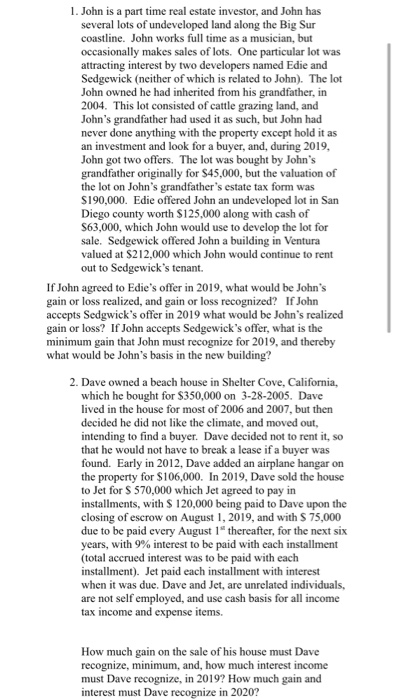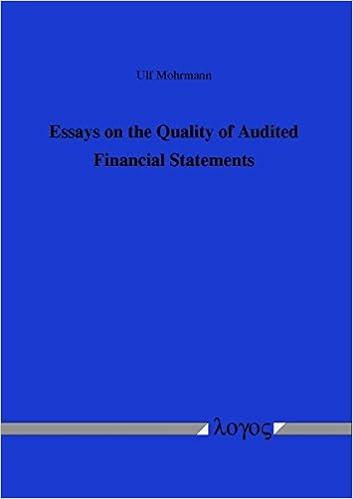All named individuals are citizens of the United States, all cities are in California.
1. John is a part time real estate investor, and John has several lots of undeveloped land along the Big Sur coastline. John works full time as a musician, but occasionally makes sales of lots. One particular lot was attracting interest by two developers named Edie and Sedgewick (neither of which is related to John). The lot John owned he had inherited from his grandfather, in 2004. This lot consisted of cattle grazing land, and Johns grandfather had used it as such, but John had never done anything with the property except hold it as an investment and look for a buyer, and, during 2019, John got two offers. The lot was bought by Johns grandfather originally for $45,000, but the valuation of the lot on Johns grandfathers estate tax form was $190,000. Edie offered John an undeveloped lot in San Diego county worth $125,000 along with cash of $63,000, which John would use to develop the lot for sale. Sedgewick offered John a building in Ventura valued at $212,000 which John would continue to rent out to Sedgewicks tenant.
If John agreed to Edies offer in 2019, what would be Johns gain or loss realized, and gain or loss recognized? If John accepts Sedgwicks offer in 2019 what would be Johns realized gain or loss? If John accepts Sedgewicks offer, what is the minimum gain that John must recognize for 2019, and thereby what would be Johns basis in the new building?
1. John is a part time real estate investor, and John has several lots of undeveloped land along the Big Sur coastline. John works full time as a musician, but occasionally makes sales of lots. One particular lot was attracting interest by two developers named Edie and Sedgewick (neither of which is related to John). The lot John owned he had inherited from his grandfather, in 2004. This lot consisted of cattle grazing land, and John's grandfather had used it as such, but John had never done anything with the property except hold it as an investment and look for a buyer, and, during 2019, John got two offers. The lot was bought by John's grandfather originally for $45,000, but the valuation of the lot on John's grandfather's estate tax form was $190,000. Edie offered John an undeveloped lot in San Diego county worth $125,000 along with cash of $63,000, which John would use to develop the lot for sale. Sedgewick offered John a building in Ventura valued at $212,000 which John would continue to rent out to Sedgewick's tenant. If John agreed to Edie's offer in 2019, what would be John's gain or loss realized, and gain or loss recognized? If John accepts Sedgwick's offer in 2019 what would be John's realized gain or loss? If John accepts Sedgewick's offer, what is the minimum gain that John must recognize for 2019, and thereby what would be John's basis in the new building? 2. Dave owned a beach house in Shelter Cove, California, which he bought for $350,000 on 3-28-2005. Dave lived in the house for most of 2006 and 2007, but then decided he did not like the climate, and moved out, intending to find a buyer. Dave decided not to rent it, so that he would not have to break a lease if a buyer was found. Early in 2012, Dave added an airplane hangar on the property for $106,000. In 2019, Dave sold the house to Jet for $570,000 which Jet agreed to pay in installments, with $ 120,000 being paid to Dave upon the closing of escrow on August 1, 2019, and with $ 75,000 due to be paid every August 1" thereafter, for the next six years, with 9% interest to be paid with each installment (total accrued interest was to be paid with each installment). Jet paid each installment with interest when it was due. Dave and Jet, are unrelated individuals, are not self employed, and use cash basis for all income tax income and expense items. How much gain on the sale of his house must Dave recognize, minimum, and, how much interest income must Dave recognize, in 2019? How much gain and interest must Dave recognize in 2020? 1. John is a part time real estate investor, and John has several lots of undeveloped land along the Big Sur coastline. John works full time as a musician, but occasionally makes sales of lots. One particular lot was attracting interest by two developers named Edie and Sedgewick (neither of which is related to John). The lot John owned he had inherited from his grandfather, in 2004. This lot consisted of cattle grazing land, and John's grandfather had used it as such, but John had never done anything with the property except hold it as an investment and look for a buyer, and, during 2019, John got two offers. The lot was bought by John's grandfather originally for $45,000, but the valuation of the lot on John's grandfather's estate tax form was $190,000. Edie offered John an undeveloped lot in San Diego county worth $125,000 along with cash of $63,000, which John would use to develop the lot for sale. Sedgewick offered John a building in Ventura valued at $212,000 which John would continue to rent out to Sedgewick's tenant. If John agreed to Edie's offer in 2019, what would be John's gain or loss realized, and gain or loss recognized? If John accepts Sedgwick's offer in 2019 what would be John's realized gain or loss? If John accepts Sedgewick's offer, what is the minimum gain that John must recognize for 2019, and thereby what would be John's basis in the new building? 2. Dave owned a beach house in Shelter Cove, California, which he bought for $350,000 on 3-28-2005. Dave lived in the house for most of 2006 and 2007, but then decided he did not like the climate, and moved out, intending to find a buyer. Dave decided not to rent it, so that he would not have to break a lease if a buyer was found. Early in 2012, Dave added an airplane hangar on the property for $106,000. In 2019, Dave sold the house to Jet for $570,000 which Jet agreed to pay in installments, with $ 120,000 being paid to Dave upon the closing of escrow on August 1, 2019, and with $ 75,000 due to be paid every August 1" thereafter, for the next six years, with 9% interest to be paid with each installment (total accrued interest was to be paid with each installment). Jet paid each installment with interest when it was due. Dave and Jet, are unrelated individuals, are not self employed, and use cash basis for all income tax income and expense items. How much gain on the sale of his house must Dave recognize, minimum, and, how much interest income must Dave recognize, in 2019? How much gain and interest must Dave recognize in 2020








